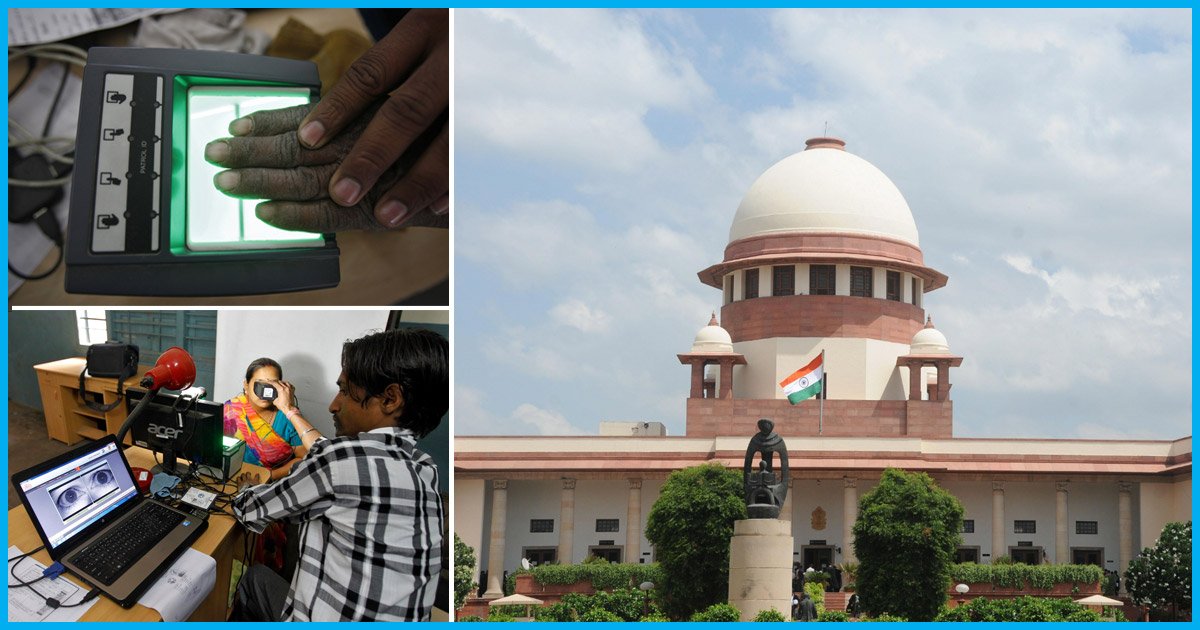
Citizens Do Not Have An Absolute Right Over Their Bodies: Govt To Supreme Court
3 May 2017 7:49 AM GMT
On 26 April 2017, cases for linking Aadhaar to PAN and making it mandatory for filing Income Tax (IT) returns were heard before the bench of Justice A K Sikri and Justice Alok Bhushan in the Supreme Court.
Senior counsels Arvind Datar and Shyam Divan were representing the petitioners in these cases, Binoy Viswam v. Union of India (W.P.(C)247/2017), S.G. Vombatkere & Anr. v. Union of India (W.P.(C) 277/2017) respectively, while the Union of India was represented by the Attorney General, Mukul Rohatgi.
The session began as the Court heard arguments against the insertion of Section 139AA to the Income Tax Act, 1961 which makes Aadhaar mandatory for filing IT returns from 1 july 2017.
The privacy issues with Aadhaar – data leaks of millions of citizens, and the violation of an individual’s right over their body were also pointed out by the petitioners’ lawyers.
Mr Divan: fingerprints are the most valued way of identifying myself, govt itself is giving up #Aadhaar numbers, half the info is give.
— sflc.in (@SFLCin) April 28, 2017
Mr Divan: proof of identity & proof of address doc are to be given to private parties, not govt.Can state force me to give it to third party
— sflc.in (@SFLCin) April 28, 2017
Mr Divan: I am willing to pay my taxes, cannot compel me to speak to someone and give info i don't want to, not under 19(2)
— sflc.in (@SFLCin) April 28, 2017
Mr Divan: State has no eminent domain over body of individual #Aadhaar
— sflc.in (@SFLCin) April 28, 2017
Blanket stay on Section 139AA, restrain from coercive action to link Aadhaar to PAN, and retrain from making PAN invalid were the demands of the petitioners.
Mr Divan asks for:
1. Blanket stay on 139AA
2. restrain from coercive action to link #Aadhaar PAN
3. Restrain from making PAN invalid— sflc.in (@SFLCin) April 28, 2017
On Tuesday, AG Mukul Rohatgi began his arguments and pointed out that Income Tax by its very nature is coercive, but it provides amenities to people. So there is no question of it being in violation of Article 19. Further, he said that Article 21 cannot be invoked merely on the question of taxation. The Parliament is the sole authority to decide the rules of taxation.
AG: to provide amenities to people, you require taxation,it is coercive, cant challenge that tax is high or low, need machinery to implement
— sflc.in (@SFLCin) May 2, 2017
To argue against bodily intrusion, he said that citizens do not have an absolute right over their body. “The concept of absolute right over one’s body was a myth and there were various laws which put restrictions on such a right.”
AG: Your absolute right over your body is prohibited by the state. For eg: termination of pregnancy, breath analyzer
— sflc.in (@SFLCin) May 2, 2017
AG: we have full body scanners, these are essential today, can't say that we have so called privacy.
— sflc.in (@SFLCin) May 2, 2017
AG: the argument of the so called privacy and bodily intrusion is bogus, today we don't live the way we want to project to the court
— sflc.in (@SFLCin) May 2, 2017
AG: to live in a society, cant say I don't want to be identified; in motor vehicles act, have to wear seat belt, that's not bodily intrusion
— sflc.in (@SFLCin) May 2, 2017
The AG further quoted Rousseau and the social contract theory, and said that the State is like a corporation and the citizens are its members. To avail benefits from the State, we need to comply with the rules and regulations made by it.
AG: if you want comfort from state, then you have to comply with the state's rules.
— sflc.in (@SFLCin) May 2, 2017
The government also made the argument that documents similar to Aadhaar have already been functioning in many countries. US’ social security number was used as an example.
AG: Social security in the USA started with food security and then encompassed a lot of other aspects as it was considered necessary.
— sflc.in (@SFLCin) May 2, 2017
Points to ponder
- Is the argument ‘if you want comfort from State, you need to comply with the State’s rules’ valid in a democracy?
- The government cited US’ social security number as an example. But how valid is this argument when the social security number is neither used as a personal identification document, nor carries any biometric information of the citizens?
- As the Preamble to the Indian Constitution guarantees dignity of individuals, isn’t compelling people to part with their biometric data a violation of the fundamental right to life as guaranteed by Article 21 of the Constitution?
- In the 1930s, when the Social Security Number was created, the US government decided not to collect fingerprints, on grounds that “the use of fingerprints was associated in the public mind with criminal activity, making this approach undesirable.” Won’t the same be interpreted by the Indian citizens, that their own government has no trust in them?
 All section
All section













